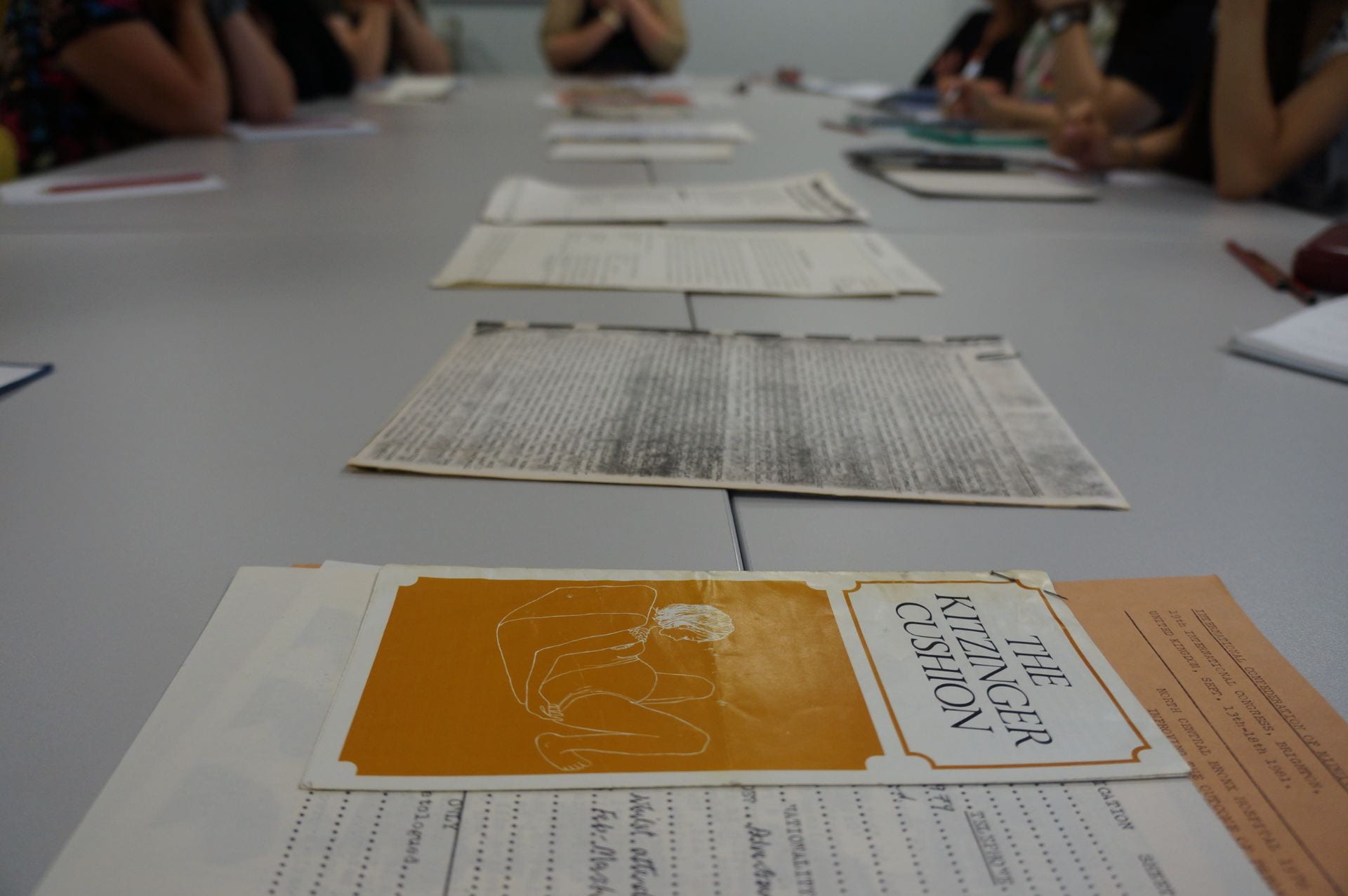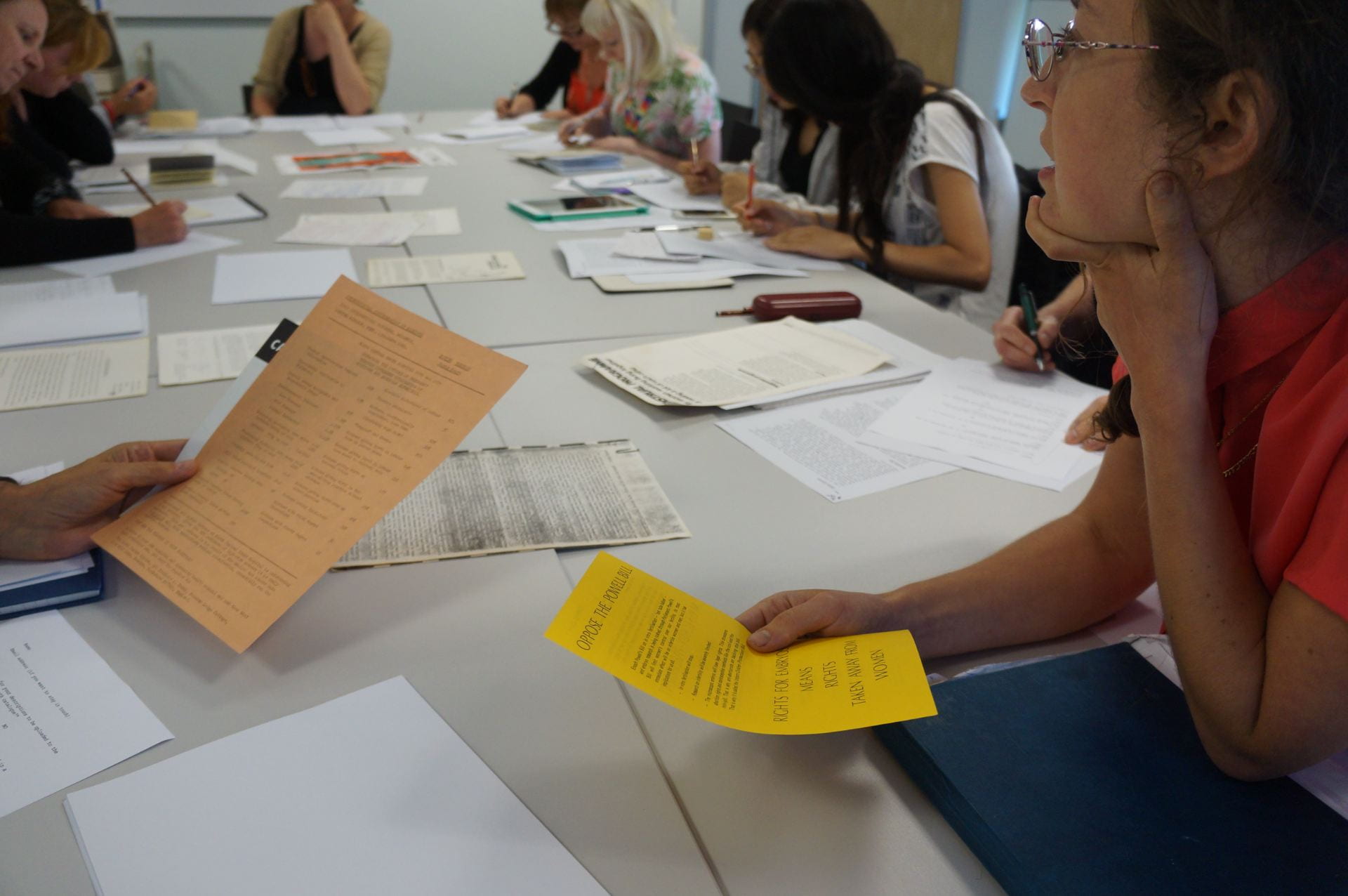Re-imagining the Feminist Archive South
How can researchers to use new digital tools and community-led practices to develop and reveal hidden gems within the Feminist Archive South?

The Feminist Archive South (FAS), based in Special Collections at the University of Bristol, holds over 160 metres of material relating to the history of local, national and transnational feminism (1960-2000s). The FAS contains periodicals, books, newsletters, magazines, video, music, oral histories and other ephemera. It is a rich resource for interdisciplinary research and pedagogy, and is used extensively by students and researchers from within the University of Bristol and other institutions. Despite the demonstrable value of the FAS to the University of Bristol and wider research community, the collection remains vastly under-used because of limited cataloguing.
In 2017, digital archival tools had evolved to become enormously powerful and sophisticated. There was the potential to link datasets in dynamic ways, as seen in the wide adoption of big data analytics. It was also possible to devise contributive, community-led annotation practices that enable new, democratic modes of archival care and knowledge production. Furthermore, open source tools continue to develop, supported by an engaged and dynamic community of practice, thus helping the wider digital preservation field to become resilient to a culture of persistent technological innovation. These factors point to how the digital archive, as a site where knowledge is both preserved and generated, will perform a central educational role within the digitally grammatised 21st century.
Ensuring that archival collections are substantially described through digital or programming languages is therefore essential if artefacts are to survive and thrive in the digital long term. Without detailed metadata and description, collections remain inaccessible, under-used and virtually invisible to researchers. Furthermore, the design of ‘information architectures’ performs a key role in the production of knowledge, an issue that has particular inflections within feminist thought and practice.
What did the project involve?
This project explored what technologies, digital literacies and community relationships are required to ensure that the FAS is adequately designed to thrive within the 21st century information environment. To attain this, this project:
- Conducted research with computer programmers, data specialists, digital archivists, digital humanities scholars and practitioners to understand what technical capacities and possibilities already exist for digital archives, and how they can be applied to the FAS.
- Highlighted the different interdisciplinary uses of the FAS for teaching and research within the University of Bristol, working with Dr James Freeman, Dr Sumita Mukherjee and Dr Su Lin Lewis (History), Dr Deborah Withers and Dr Saffron Karlsen (Sociology) and Dr Josie Gill and Dr Jane Wright (English).
- Via the FAS’s networks, the project engaged feminist communities outside the University to explore the possibilities of contributive annotation and new relations of archival care.
This took the form of research and consultancy with computer programmers, data specialists, digital archivists, digital humanities scholars and practitioners to explore the creation of a new digital archive system for the FAS based on open source technology that embeds contributive annotation within its technical design. Researchers and projects that were consulted include PERICLES, an EU FP7-funded programme on preserving digital content; Dr Joris Vlieghe, an expert on the use of digital resources in education; the Digital Transgender Archive, a network of archives of transgender culture and activism; and L’Institut de recherche et d’innovation (IRI), a centre for digital humanities research based at the Centre Pompidou, Paris.


The project held two workshops with members of the public to explore the possibilities for contributive annotation and new forms of archival engagement, based on Dr Withers’ ‘Meta-Data Diaries: Collective Annotation’ method.


The project also held three interdisciplinary workshops with postgraduate students drawn from Arts, Humanities and Social Sciences to explore the FAS, and devise strategies for embedding content within existing or emerging curriculum. These workshops also created space for reflecting, across schools and disciplines, on how best to use archival material to develop pedagogical practice.
Who are the team and what do they bring?
- Maria Fannin (Geographical Sciences, University of Bristol) is a researcher who focuses on feminist body politics and gendered perspectives on science and technology. She brings experience leading the FSSL Gender Research Group and an interest in enhancing the utility of the FAS for researchers and students, and specifically the holdings on mental and sexual health.
- Deborah Withers (Feminist Archive South, University of Bristol) is a Trustee of the FAS, Teaching Associate in SPAIS, and author of Feminism, Digital Culture and the Politics of Transmission: Theory, Practice and Cultural Heritage. She has interest in how digital technologies can be used to widen access to the archive for teaching and research.
- Hannah Lowery (Special Collections, University of Bristol) is Archivist and Special Collections Manager at the University Library and has been closely involved with the FAS since its arrival in Special Collections in 2008.
What were the results?
Please visit the Feminist Archive South website for the most up to date information on the continued work with the archive.
From this project D-M Withers and Maria Fannin co-wrote chapter 9 of Education in the Age of the Screen Possibilities and Transformations in Technology entitled ‘ Digital literacy in the age of the screen? Re-imagining the social pedagogy of the archive’.
D-M Withers and Maria Fannin presenting their work in and on the Feminist Archive South at a workshop on ‘Making School in the Age of the Screen’ at Liverpool Hope University on the 26-27 May 2017 and at a public exhibition as part of the University of Bristol’s Brigstow Institute on the 23-24 October 2017.
Fannin also wrote a brief introduction to the Feminist Archive South.

